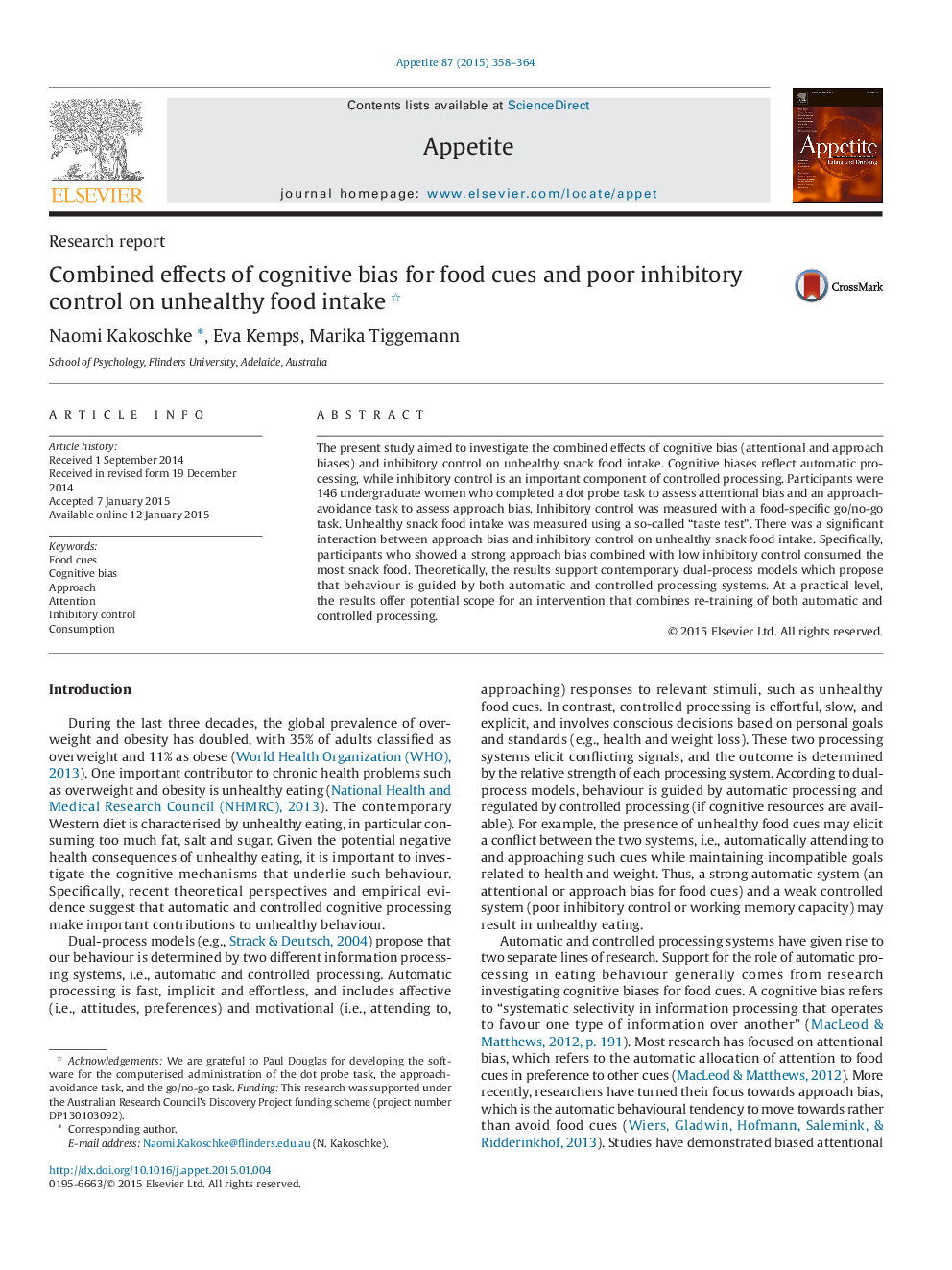| کد مقاله | کد نشریه | سال انتشار | مقاله انگلیسی | نسخه تمام متن |
|---|---|---|---|---|
| 7309592 | 1475393 | 2015 | 7 صفحه PDF | دانلود رایگان |
عنوان انگلیسی مقاله ISI
Combined effects of cognitive bias for food cues and poor inhibitory control on unhealthy food intake
ترجمه فارسی عنوان
اثرات ترکیبی تعصب شناختی برای نشانه های غذا و کنترل ضعیف بر مصرف غذاهای ناسالم
دانلود مقاله + سفارش ترجمه
دانلود مقاله ISI انگلیسی
رایگان برای ایرانیان
کلمات کلیدی
نشانه های غذا، تعصب شناختی، رویکرد، توجه کنترل مهار، مصرف،
ترجمه چکیده
پژوهش حاضر با هدف بررسی اثرات ترکیبی تعصب شناختی (بی توجهی های توجه و رویکرد) و کنترل مهار کننده بر مصرف خوراک های نوشیدنی خوراک میان وعده انجام شده است. تعصبات شناختی منعکس کننده پردازش اتوماتیک است، در حالی که کنترل مهار کننده یک جزء مهم پردازش کنترل شده است. شرکت کنندگان 146 دانشجوی کارشناسی ارشد بودند که یک وظیفه دندانپزشکی را برای ارزیابی تعصب توجه و یک کار اجتناب از رویکرد برای ارزیابی رویکرد تعصب تکمیل کردند. کنترل مهارتی با یک کار مخصوص رفتن به غذا / بدون غذا اندازه گیری شد. مصرف نوشیدنی های غذای میان وعده با استفاده از یک تست چای به اصطلاح سنجیده شد. بین تعارض رویکرد و کنترل مهار کننده بر مصرف غذاهای ناسالم در میان غذاهای میان وعده ارتباط معنیداری وجود داشت. به طور خاص، شرکت کنندگان که نشان دادند که اختلاف نظر قوی در ترکیب با کنترل مهار کننده کم مصرف خوراک اسنک بیشتر است. از لحاظ تئوری، نتایج از مدل های دوفایل معاصر پشتیبانی می کند که پیشنهاد می کنند که رفتار توسط سیستم های پردازش اتوماتیک و کنترل شده هدایت می شود. در سطح عملی، نتایج حوزه بالقوه برای مداخله ای فراهم می کند که شامل آموزش مجدد پردازش اتوماتیک و کنترل شده می باشد.
موضوعات مرتبط
علوم زیستی و بیوفناوری
علوم کشاورزی و بیولوژیک
دانش تغذیه
چکیده انگلیسی
The present study aimed to investigate the combined effects of cognitive bias (attentional and approach biases) and inhibitory control on unhealthy snack food intake. Cognitive biases reflect automatic processing, while inhibitory control is an important component of controlled processing. Participants were 146 undergraduate women who completed a dot probe task to assess attentional bias and an approach-avoidance task to assess approach bias. Inhibitory control was measured with a food-specific go/no-go task. Unhealthy snack food intake was measured using a so-called “taste test”. There was a significant interaction between approach bias and inhibitory control on unhealthy snack food intake. Specifically, participants who showed a strong approach bias combined with low inhibitory control consumed the most snack food. Theoretically, the results support contemporary dual-process models which propose that behaviour is guided by both automatic and controlled processing systems. At a practical level, the results offer potential scope for an intervention that combines re-training of both automatic and controlled processing.
ناشر
Database: Elsevier - ScienceDirect (ساینس دایرکت)
Journal: Appetite - Volume 87, 1 April 2015, Pages 358-364
Journal: Appetite - Volume 87, 1 April 2015, Pages 358-364
نویسندگان
Naomi Kakoschke, Eva Kemps, Marika Tiggemann,
